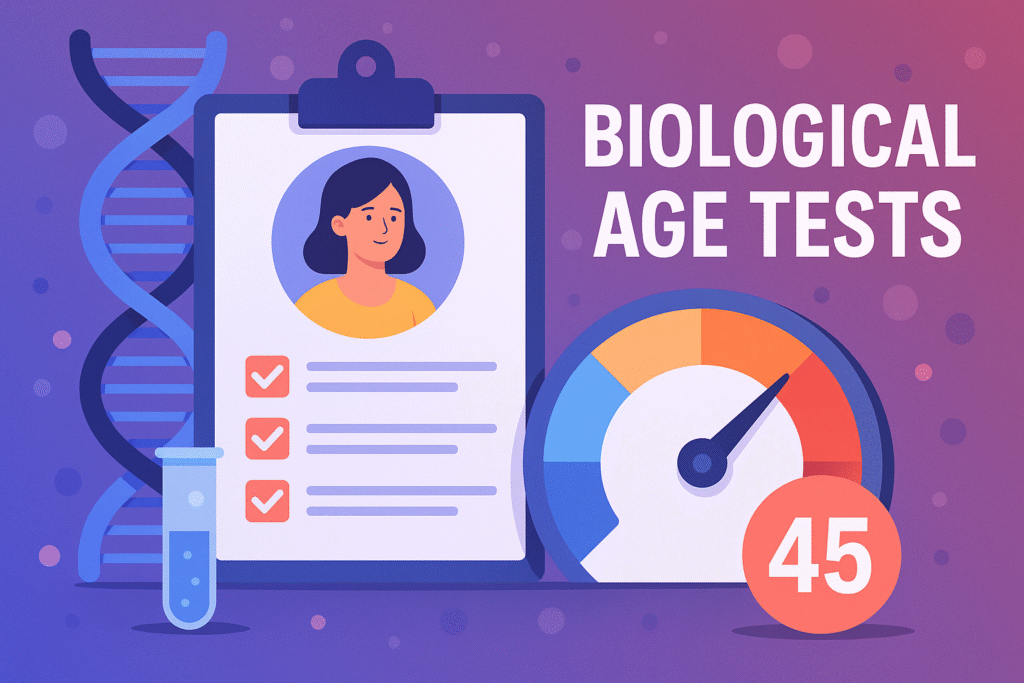Aging is inevitable, but not everyone ages at the same rate. Some 50-year-olds have the vitality of a 30-year-old, while others feel decades older. This discrepancy has led to the rise of biological age tests, which claim to measure how well your body is aging compared to your chronological age.
But how accurate are these tests? Do they actually provide meaningful insights, or are they just another wellness trend? Let’s break down the science behind biological age testing and whether it’s worth your time and money.

What Is Biological Age?
Your chronological age is simply the number of years you’ve been alive. Biological age, on the other hand, reflects how your cells and organs are functioning based on factors like:
- DNA methylation (epigenetic changes)
- Telomere length (protective caps on chromosomes)
- Biomarkers (inflammation, cholesterol, blood sugar)
- Lifestyle factors (diet, exercise, stress, sleep)
A 45-year-old with excellent health markers might have a biological age of 38, while someone with poor habits could biologically be closer to 55.
How Do Biological Age Tests Work?
Several methods exist to estimate biological age, each with varying levels of scientific backing:
1. Epigenetic Clocks (DNA Methylation Tests)
The most well-researched method analyzes DNA methylation—chemical modifications to DNA that change with age. Popular tests include:
- Horvath’s Clock (2013) – Measures methylation at 353 DNA sites.
- PhenoAge – Incorporates clinical biomarkers.
- GrimAge – Predicts mortality risk based on methylation.
How it works: A saliva or blood sample is analyzed in a lab, and algorithms estimate biological age. Companies like Elysium Health, TruDiagnostic, and Chronomics offer these tests.
2. Telomere Length Testing
Telomeres shorten as cells divide, linked to aging and disease. Tests measure leukocyte (white blood cell) telomere length. However, results can vary daily, and their predictive power is debated.
3. Blood Biomarker Panels
Some companies (e.g., InsideTracker) use blood tests to assess markers like:
- HbA1c (blood sugar control)
- CRP (inflammation)
- Cholesterol levels
These are combined into an “age score,” though this method is less precise than epigenetic testing.
4. Physiological Tests
Some clinics assess:
- VO₂ max (aerobic fitness)
- Skin elasticity
- Cognitive function
These provide a snapshot of health but aren’t as standardized.
Biological Age Calculators: Quick Estimation Tools
If you want a rough estimate without lab tests, several online calculators and apps use health and lifestyle data to predict biological age:
1. DoNotAge Biological Age Calculator
- How it works: Answers questions about diet, exercise, sleep, and stress.
- Used by: Biohackers and longevity enthusiasts.
2. Aging.AI
- How it works: Upload blood test results for an AI-powered estimate.
- Used by: Researchers and quantified-self followers.
3. LEVL Biological Age Test
- How it works: Measures breath acetone (fat metabolism marker).
- Used by: Fitness professionals and keto dieters.
4. Thorne Biological Age Test
- How it works: Blood test analyzing inflammation and cellular aging.
- Used by: Health-conscious consumers and athletes.
5. RealAge Test (by Sharecare)
- How it works: Lifestyle and health history questionnaire.
- Used by: Popularized by Dr. Oz.
These tests typically range from 200−200−500 for comprehensive epigenetic analyses, with basic biomarker panels starting around $200. Free online calculators exist but offer less precision.
How to Test Your Biological Age at Home (Easy Steps)
While lab tests provide the most accurate results, you can estimate your biological age at home using these simple methods:
1. Use Free Online Calculators
Best for: Quick, free assessment
2. Check Your Resting Heart Rate (RHR)
- <60 bpm = Excellent (younger biological age)
- 60-75 bpm = Good
- >75 bpm = Higher biological age likely
Best for: Cardiovascular health insight
3. The Sitting-Rising Test (SRT)
- 10 points (full success) = Younger biological age
- Subtract 1 point for each hand/knee used
- <5 points suggests higher biological age
Best for: Mobility and muscle strength assessment
4. Skin Elasticity Test
- <1 second = Younger biological age
- 1-2 seconds = Normal
- >3 seconds = Reduced elasticity
Best for: Skin aging evaluation
5. Home Blood Pressure & Glucose Tests
- BP: <120/80 mmHg
- Fasting glucose: <100 mg/dL
For More Accuracy:
- Consider at-home test kits like:
- Thorne Biological Age Test ($199, finger-prick blood sample)
- Elysium Index ($499, blood spot card)
Pro Tip: Combine multiple methods for a more complete picture of your biological age!
(Note: These methods provide estimates only. For clinical-grade results, professional testing is recommended.)
Celebrities & Influencers Using Biological Age Tests
- Bryan Johnson (Blueprint Project) – Uses TruDiagnostic epigenetic testing to track anti-aging efforts.
- Dave Asprey (Bulletproof Founder) – Advocates for telomere and methylation tests.
- Peter Attia (Longevity Doctor) – Discusses biological age biomarkers regularly.
- Serena Williams – Reportedly uses InsideTracker for performance optimization.
Are Biological Age Tests Legitimate?
The Pros:
- Epigenetic clocks are scientifically validated – Studies show strong correlations between methylation age and disease risk.
- Can motivate healthier habits – Seeing an older biological age may push people to improve diet, exercise, or sleep.
- Research potential – Scientists use these tests to study anti-aging interventions like fasting or metformin.
The Cons:
- Not all tests are equal – Some commercial tests lack peer-reviewed validation.
- Results can fluctuate – Stress, illness, or recent lifestyle changes may skew readings.
- Limited clinical utility – Doctors don’t yet use these for medical decisions.
- Expensive – Tests range from $100 to over $500, often not covered by insurance.
Should You Take One?
If you’re curious and can afford it, an epigenetic test (like GrimAge or PhenoAge) may offer the most reliable insights. However:
- Don’t panic over a high biological age—it’s a snapshot, not destiny.
- Focus on actionable changes (better sleep, exercise, stress management).
- Consult a doctor before making major health decisions based on results.
For a free estimate, try DoNotAge or RealAge calculators, but remember they’re less precise than lab tests.
How to Improve Your Biological Age
If your test reveals room for improvement, research-backed strategies include:
- Exercise regularly (strength + cardio)
- Eat a Mediterranean-style diet (healthy fats, antioxidants)
- Prioritize sleep (7-9 hours nightly)
- Manage stress (meditation, mindfulness)
- Avoid smoking & excess alcohol
Some studies suggest intermittent fasting, NAD+ boosters (like NMN), and rapamycin may help, but more research is needed.
Final Verdict: Useful but Not Perfect
Biological age tests, especially DNA methylation-based ones, offer fascinating insights into aging. While not yet a medical necessity, they can be a helpful tool for those optimizing longevity. Just remember—aging is complex, and no single test can capture the full picture.
Would you take a biological age test? Let us know in the comments!
Sources:
- Horvath, S. (2013). DNA methylation age of human tissues and cell types. Genome Biology.
- Levine, M. E. (2018). An epigenetic biomarker of aging for lifespan and healthspan. Aging.
- López-Otín, C. (2013). The hallmarks of aging. Cell.
(This article is for informational purposes only and not medical advice. Consult a healthcare professional before making health decisions.)
Also Read About : Dermatologists Hate This Trick for Perfect Skin!
Visit Our Doctors At : https://g.co/kgs/rTqAjgt





